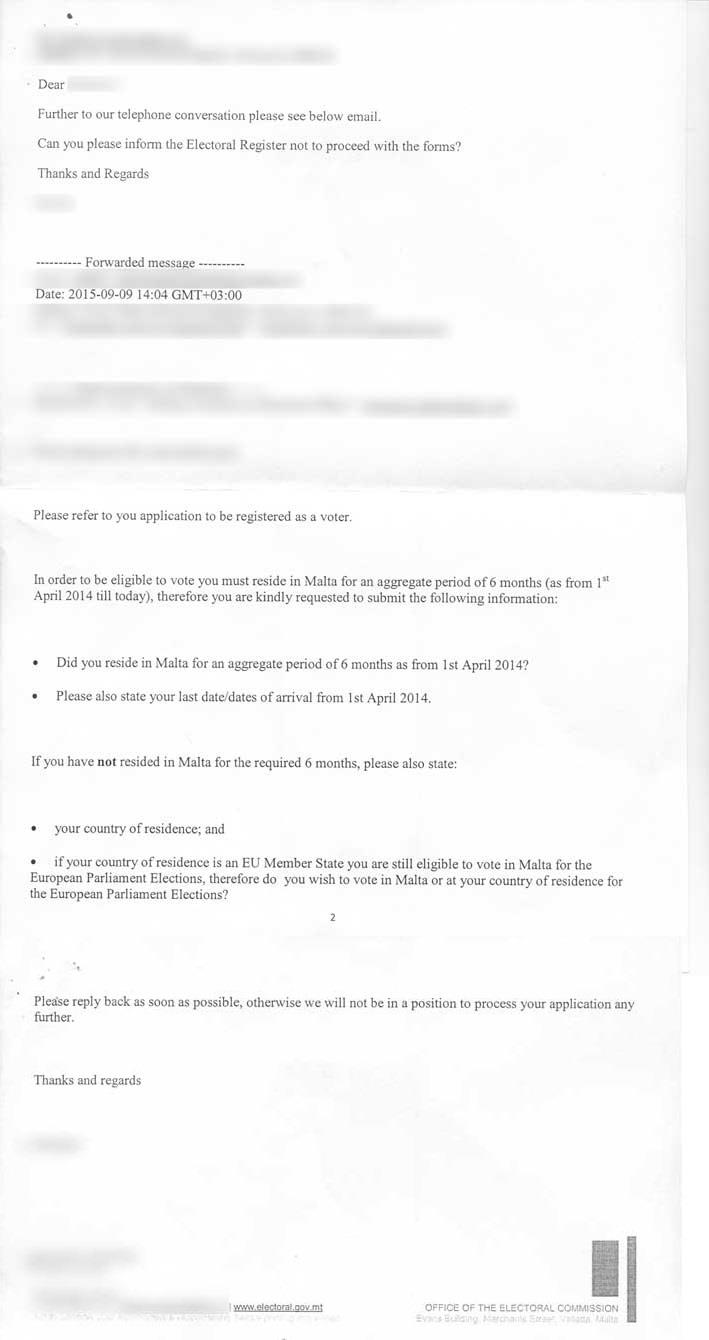E-mail exchanges in the possession of The Malta Independent show how the Chief Electoral Commissioner Joseph Church was aware of irregularities in voting applications of IIP citizenship buyers before it being flagged by the Opposition.
This directly contradicts comments given by Mr Church to other media, where he clearly stated he had been unaware that voter applications not meeting Constitutional criteria to vote were being processed before the Nationalist Party broke the story.
Efforts to contact Mr Church have proved fruitless, having declined to speak with this newsroom via his staff. Further efforts to meet with him face to face in order to present him with the e-mail exchange were also unsuccessful.

First email contents
The e-mail exchange first shows a citizenship buyer forwarding a message received to her from an Electoral Commission desk officer to her probable husband/partner. The e-mail by the desk officer flags short comings in the voter application.
“In order to be eligible to vote you must reside in Malta for an aggregate period of six months (as from 1 April 2014 till today), therefore you are kindly requested to submit the following information:
“Did you reside in Malta for an aggregate period of six months as from 1 April 2014?
“Please also state your last date/dates of arrival from 1 April 2014.
“If you have not resided in Malta for the required six months, please also state: your country of residence; and if your country of residence is an EU Member State you are still eligible to vote in Malta for the European Parliament Elections, therefore do you with to vote in Malta or at your country of residence for the European Parliament Elections?
“Please reply back as soon as possible, otherwise we will not be in a position to process your application further.”
The other two Constitutional criteria in order to be eligible to vote in Malta is that a person must be over 18 and hold Maltese citizenship.

Second email
The next e-mail is between an IIP agent, somebody tasked with meeting with possible passport buyers and assisting them with the process, and an Identity Malta representative.
The very same desk officer is copied in, and the IIP agent clearly asks for the voter application of the person in question not to be processed further, copying in the original e-mail which flags the shortcomings. It also speaks of a phone conversation.
A second e-mail is sent by the very same IIP agent to the Identity Malta representative and the Electoral Commission desk officer, asking if “this has been sorted please?”
Finally, the desk officer sends an e-mail to Mr Church, with all the above e-mail correspondence, with a short message attatched: “E-mail below refers.”
Mr Church replies to emails
Mr Church replies back to say “noted.” This final e-mail was sent on 11 September 2015 – clearly showing that his employee had made him aware of what was going on.
The deadline for applications to be approved so that applicants can be placed on the October Electoral Register was 30 September, which is when the IIP buyer in question had her application approved.
This shows that Mr Church was aware of the situation prior to the applicant being placed on the Electoral Register, but nothing was done to prevent this from happening. In order to be struck off the register, a case must be opened up for the courts to decide.
Had a meeting taken place with Mr Church this newsroom would have first and foremost asked him to confirm that the e-mail exchange took place, and for an explanation and/or reaction as to what it suggests.
In previous comments to MaltaToday, Mr Church said: “The commission is currently carrying out a fact-finding exercise to determine what action to take,” Church added.
"We are leaving all options open, The Commission will be meeting tomorrow to discuss further the issue.”
Church added that the electoral commission had not been aware of the ‘irregularities’ before the Opposition broke the news.
After the Opposition originally broke the story, they filed 91 separate cases against the 91 voter application irregularities were found from a sample of 100.
Recently, Justice Minister Owen Bonnici stressed that the Electoral Commission has the necessary remedies available to correct any irregularities, and also insisted that there was “no abuse” taking place.